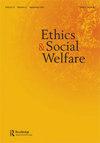白人关怀的非殖民化:与福利中的殖民暴力的关系思考
IF 0.9
Q4 SOCIAL WORK
引用次数: 1
摘要
摘要:本文致力于从全球西北欧白人内部讨论护理伦理与非殖民化之间的潜在联系。它采用了一种女权主义的心理社会立场,将日常生活的现实理解为不断变化的动态纠葛,通过复杂的空间和时间扩展材料、话语和情感实践产生关系。首先,它将自由福利国家定位为西北欧殖民主义全球项目的一部分,该项目暴力地将白人幻想确立为植根于个人主权和占有权的人类理想(Moreton Robinson,2015)。接下来,它揭示了通过国家福利进行的护理的历史制度化是如何维持“白人无知”的;(Mills,2007)面对殖民主义正在进行的系统化种族暴力的当代现实。最后,它提出了“关系编排”的概念(Hunter,2015a;2015b),作为抵制二元自由主义个人主义自我理解的一种方式,这种自我理解是白人占有逻辑的基础。本文章由计算机程序翻译,如有差异,请以英文原文为准。
Decolonizing White Care: Relational Reckoning with the Violence of Coloniality in Welfare
ABSTRACT
This paper contributes to debates on potential connections between care ethics and decoloniality from within Global North West European whiteness. It adopts a feminist psychosocial position which understands everyday lived realities as shifting dynamic entanglements, produced relationally though complicated spatially and temporally expansive material, discursive and affective practices. First, it situates the liberal welfare state as part of a global project of North Western European colonisation which violently establishes a fantasy of whiteness as the human ideal rooted in individual sovereignty and rights to possession (Moreton-Robinson, 2015). Next it unpacks how the historical institutionalisation of care via state welfare sustains ‘white ignorance’; (Mills, 2007) in the face of the contemporary reality of ongoing systematised racial violence of coloniality. Finally, it offers the idea of ‘relational choreography’ (Hunter, 2015a; 2015b) as a way into resisting binary liberal individualist self-understanding underpinning this possessive logic of whiteness.
求助全文
通过发布文献求助,成功后即可免费获取论文全文。
去求助
来源期刊

Ethics and Social Welfare
SOCIAL WORK-
CiteScore
1.60
自引率
20.00%
发文量
36
期刊介绍:
Ethics and Social Welfare publishes articles of a critical and reflective nature concerned with the ethical issues surrounding social welfare practice and policy. It has a particular focus on social work (including practice with individuals, families and small groups), social care, youth and community work and related professions. The aim of the journal is to encourage dialogue and debate across social, intercultural and international boundaries on the serious ethical issues relating to professional interventions into social life. Through this we hope to contribute towards deepening understandings and further ethical practice in the field of social welfare. The journal welcomes material in a variety of formats, including high quality peer-reviewed academic papers, reflections, debates and commentaries on policy and practice, book reviews and review articles. We actively encourage a diverse range of contributions from academic and field practitioners, voluntary workers, service users, carers and people bringing the perspectives of oppressed groups. Contributions might include reports on research studies on the influence of values and ethics in social welfare practice, education and organisational structures, theoretical papers discussing the evolution of social welfare values and ethics, linked to contemporary philosophical, social and ethical thought, accounts of ethical issues, problems and dilemmas in practice, and reflections on the ethics and values of policy and organisational development. The journal aims for the highest standards in its published material. All material submitted to the journal is subject to a process of assessment and evaluation through the Editors and through peer review.
 求助内容:
求助内容: 应助结果提醒方式:
应助结果提醒方式:


